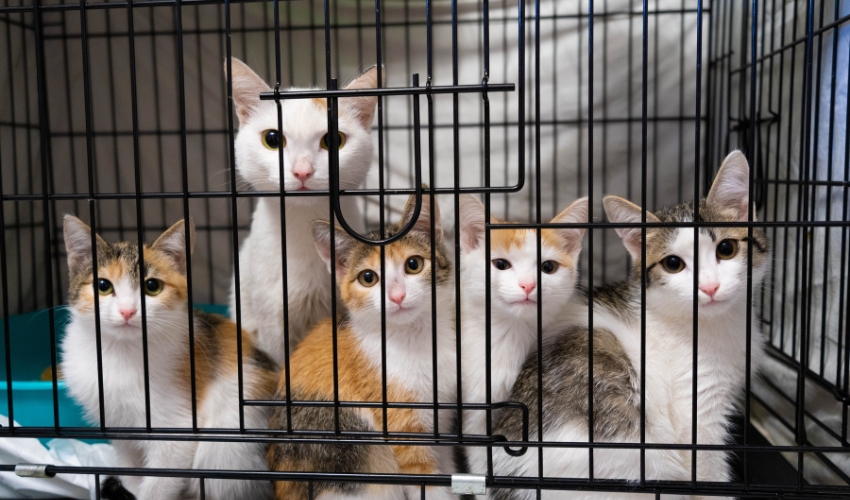If your pet exhibits signs of worms, then you might ask the question “can humans get worms from cats?” As surprising as it may seem, you need to be aware that this notion is possible.
Yes, it’s already unpleasant to see the appearance of worms on your pet.On top of that, knowing that you can get them from your pet is more concerning. To avoid this from happening, then read until the end!
Worms In Cats
Old or young, indoor or outdoor cats can get worms. It is obvious that they are meticulous groomers, yet that may cause contact with contaminated urine or feces.
Indoor cats can easily get worms through the litter box. Because worms can dwell in the muscles of their prey, outdoor cats that frequently hunt small insects or birds and live outside are also more prone to get worms.
Various kinds of intestinal worms can infect cats, and each has its own set of distinctive characteristics. These are only a few of them:
- Bladder worms
- Hookworm
- Heartworm
- Liver flukes
- Lungworm
- Roundworm
- Tapeworm
- Stomach worms
- Whipworm
The following are symptoms of worms infecting your cat:
- Visible presence of worms in cat feces, vomit, or on their fur
- Crumpled and dull fur
- Pale or white-ish gums
- Frequent vomiting
- Diarrhea
- Dark or bloody stool
- Losing weight despite a good appetite
- Low energy
What You Can Do To Prevent Worm On Cats
One can use deworming medications to treat worm-infected cats. For the medication to work, the vet might recommend administering it more than once. However, adhere to the veterinarian’s recommendations on the dosage and timing of administration.
Worm prevention is indeed easier and less taxing than curing it. So, here are a few useful ones that you should take note of:
- Keep up on your cat’s yearly preventative medications
- Consult your vet for concerns regarding worms
- If you can, keep your cat indoors
- Clean your pet’s tools and equipment regularly, especially the litter box
- Follow a schedule given by your vet, and let your cat undergo a thorough check-up
Can Humans Get Worms From Cats?

Yes, this is a probability, specifically if you come into contact with contaminated feces or dirt. Here are some sample scenarios in which you might contract worms:
- Gardening without gloves
- Cleaning a cat’s litter box without wearing gloves
- Going barefoot over contaminated soil
- Kids playing in a sandbox that has contaminated cat feces
- Eating or touching food without washing your hands
Adults and children may experience abdominal cramps, allergic reactions, discomfort, diarrhea, and vomiting from being contaminated by worms. These parasites may cause cysts, pneumonia, and neurological problems in the worst-case scenario. Intestinal worms can also hinder a child’s development.
According to Pet Shed, here are helpful things to know to prevent pet owners from getting worms:
- Avoid kissing your cats while playing with them
- Always wash hands after contact with pets
- Keep the cat from pooping in the backyard, especially close to kids’ play areas like sandboxes
- Use fences and sprinklers to stop wild cats from visiting your property and pooping in the garden or lawn
- When gardening, put on gloves to avoid touching feces directly
- Teach cats to use a litter box and have its contents disposed of and changed daily
- Pregnant people shouldn’t touch cat waste at all. If someone is expecting, this duty should go to another family member
- Although it may seem practically impossible to prevent young toddlers from eating dirt or sand, doing so will lessen the probability of getting a severe illness
- Consult a doctor if you are worried that you or a member of your family may have caught a sickness from your pet
Other Diseases You Can Get From Your Pets
There are contagious illnesses that can spread from animals to humans, and a few of them may originate in your pet. The following are some of them:
- Lyme disease
- Rabies
- Ringworm
- Toxoplasmosis
- Salmonella
- Worms
Conclusion
Can humans get worms from cats? Yes, the possibility is undeniable; worms can bring severe health issues, both for the pets and their owners. Fortunately, they can be efficiently treated and removed with the right diagnosis and treatment.
Adopting a new pet shouldn’t be hindered by this disease; even if that is the case, becoming a volunteer is still possible. What you probably need the most is a trustworthy organization, and Doobert fits that card!
Get to know them more by browsing their website and seeing how you can become part of their cause.











